Business Context: Knowledge Management and E-commerce Analysis Report
VerifiedAdded on 2019/11/25
|8
|2243
|197
Report
AI Summary
This report examines the application of knowledge management and e-commerce within the context of an Indian restaurant business in Australia. It explores how knowledge management, encompassing the creation, organization, and utilization of intellectual assets, can enhance business operations by understanding customer preferences and market trends. The report also highlights the importance of e-commerce in expanding market reach, increasing sales, and improving customer engagement through online ordering and feedback mechanisms. Furthermore, it emphasizes the integration of these strategies to achieve customer satisfaction, competitive advantage, and overall business profitability. The study covers various aspects, including marketing strategies, operational efficiency, and the importance of technology in the modern restaurant industry, concluding that the synergy of knowledge management and e-commerce is crucial for the success of the business.
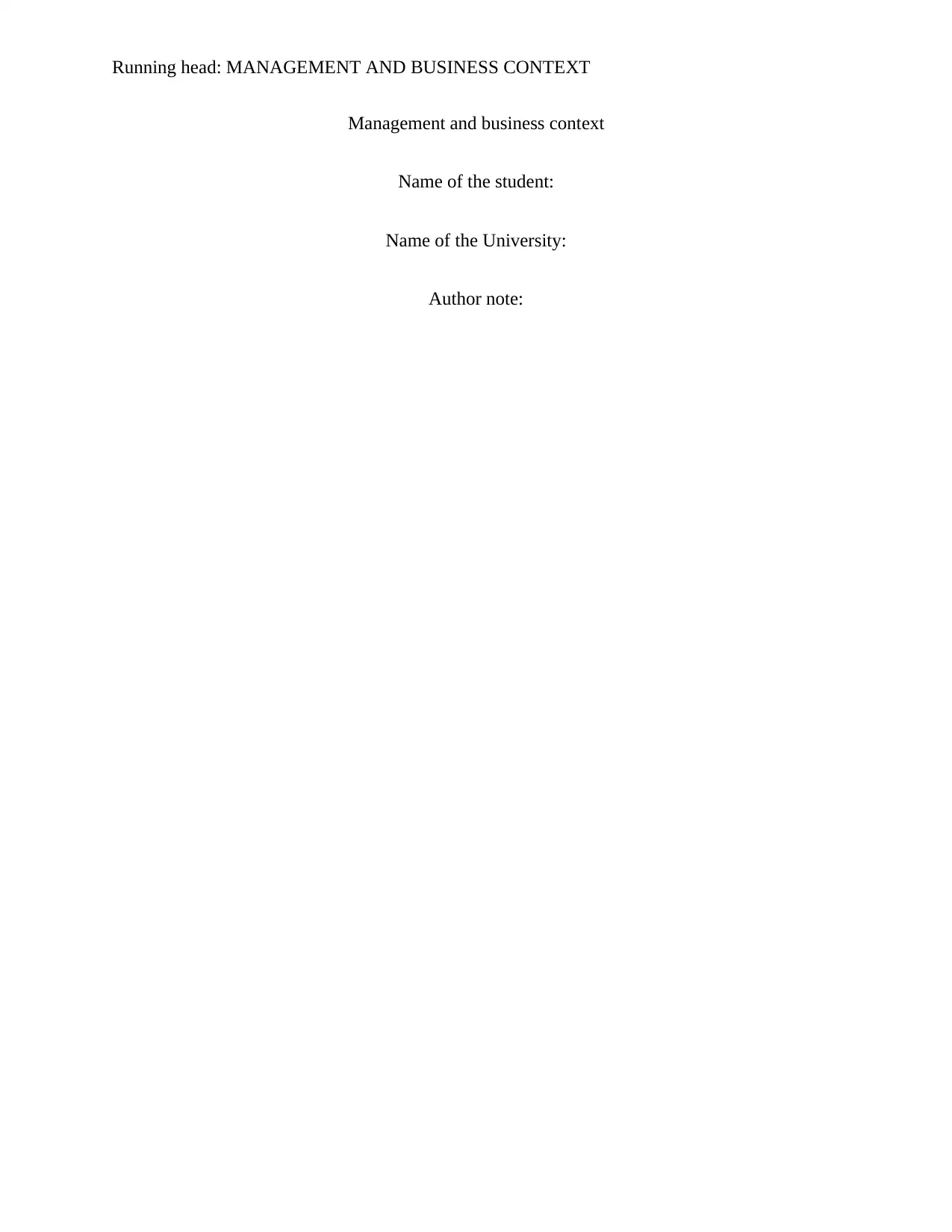
Running head: MANAGEMENT AND BUSINESS CONTEXT
Management and business context
Name of the student:
Name of the University:
Author note:
Management and business context
Name of the student:
Name of the University:
Author note:
Paraphrase This Document
Need a fresh take? Get an instant paraphrase of this document with our AI Paraphraser
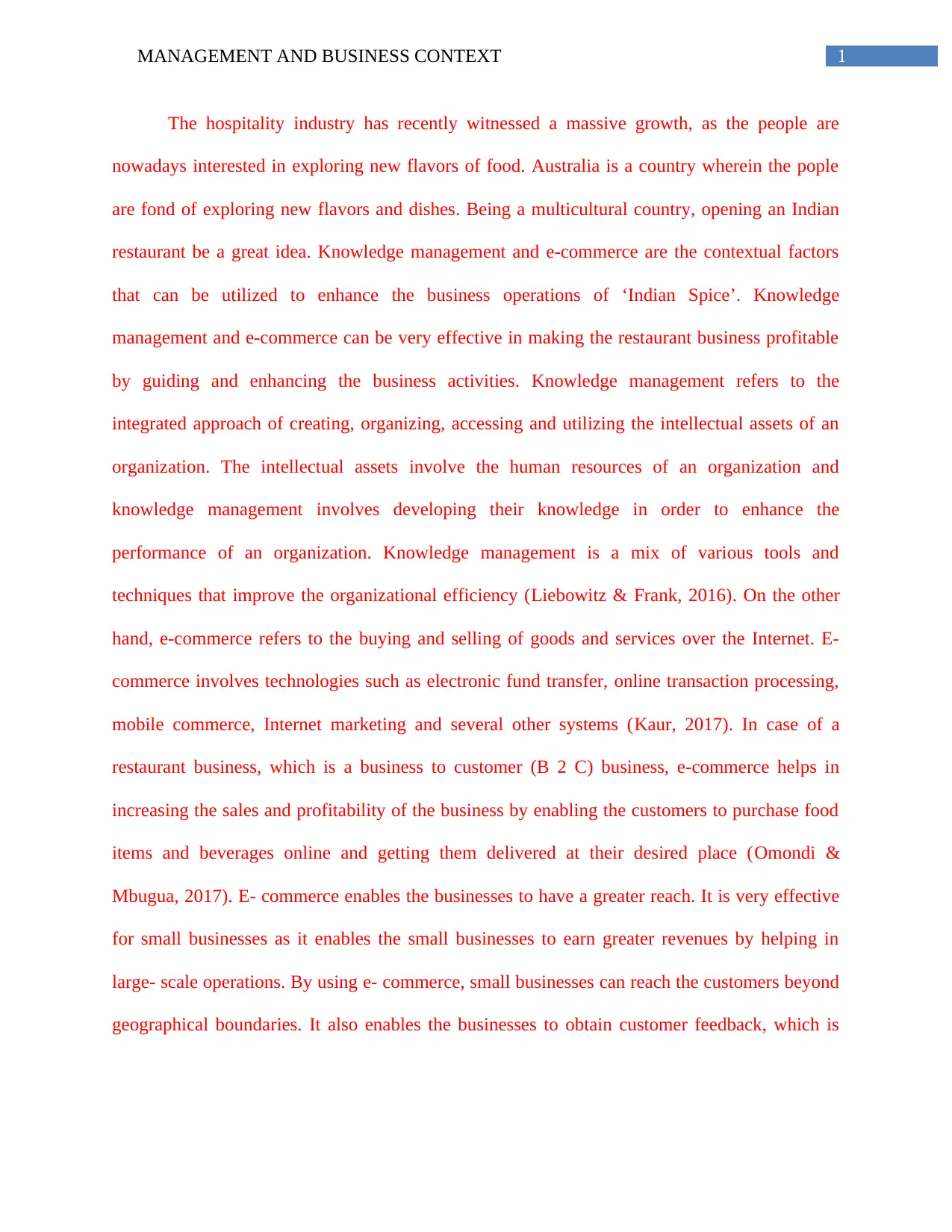
1MANAGEMENT AND BUSINESS CONTEXT
The hospitality industry has recently witnessed a massive growth, as the people are
nowadays interested in exploring new flavors of food. Australia is a country wherein the pople
are fond of exploring new flavors and dishes. Being a multicultural country, opening an Indian
restaurant be a great idea. Knowledge management and e-commerce are the contextual factors
that can be utilized to enhance the business operations of ‘Indian Spice’. Knowledge
management and e-commerce can be very effective in making the restaurant business profitable
by guiding and enhancing the business activities. Knowledge management refers to the
integrated approach of creating, organizing, accessing and utilizing the intellectual assets of an
organization. The intellectual assets involve the human resources of an organization and
knowledge management involves developing their knowledge in order to enhance the
performance of an organization. Knowledge management is a mix of various tools and
techniques that improve the organizational efficiency (Liebowitz & Frank, 2016). On the other
hand, e-commerce refers to the buying and selling of goods and services over the Internet. E-
commerce involves technologies such as electronic fund transfer, online transaction processing,
mobile commerce, Internet marketing and several other systems (Kaur, 2017). In case of a
restaurant business, which is a business to customer (B 2 C) business, e-commerce helps in
increasing the sales and profitability of the business by enabling the customers to purchase food
items and beverages online and getting them delivered at their desired place (Omondi &
Mbugua, 2017). E- commerce enables the businesses to have a greater reach. It is very effective
for small businesses as it enables the small businesses to earn greater revenues by helping in
large- scale operations. By using e- commerce, small businesses can reach the customers beyond
geographical boundaries. It also enables the businesses to obtain customer feedback, which is
The hospitality industry has recently witnessed a massive growth, as the people are
nowadays interested in exploring new flavors of food. Australia is a country wherein the pople
are fond of exploring new flavors and dishes. Being a multicultural country, opening an Indian
restaurant be a great idea. Knowledge management and e-commerce are the contextual factors
that can be utilized to enhance the business operations of ‘Indian Spice’. Knowledge
management and e-commerce can be very effective in making the restaurant business profitable
by guiding and enhancing the business activities. Knowledge management refers to the
integrated approach of creating, organizing, accessing and utilizing the intellectual assets of an
organization. The intellectual assets involve the human resources of an organization and
knowledge management involves developing their knowledge in order to enhance the
performance of an organization. Knowledge management is a mix of various tools and
techniques that improve the organizational efficiency (Liebowitz & Frank, 2016). On the other
hand, e-commerce refers to the buying and selling of goods and services over the Internet. E-
commerce involves technologies such as electronic fund transfer, online transaction processing,
mobile commerce, Internet marketing and several other systems (Kaur, 2017). In case of a
restaurant business, which is a business to customer (B 2 C) business, e-commerce helps in
increasing the sales and profitability of the business by enabling the customers to purchase food
items and beverages online and getting them delivered at their desired place (Omondi &
Mbugua, 2017). E- commerce enables the businesses to have a greater reach. It is very effective
for small businesses as it enables the small businesses to earn greater revenues by helping in
large- scale operations. By using e- commerce, small businesses can reach the customers beyond
geographical boundaries. It also enables the businesses to obtain customer feedback, which is
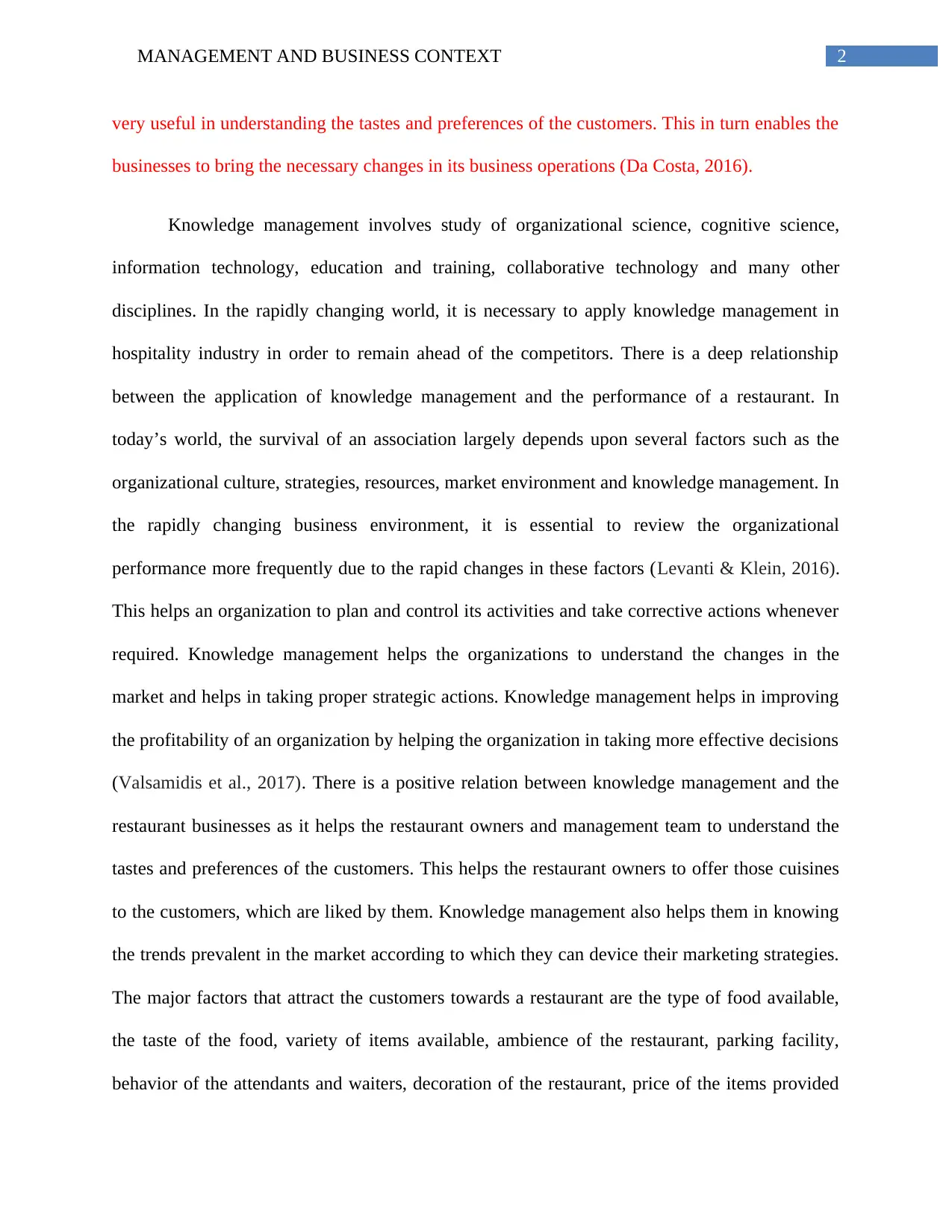
2MANAGEMENT AND BUSINESS CONTEXT
very useful in understanding the tastes and preferences of the customers. This in turn enables the
businesses to bring the necessary changes in its business operations (Da Costa, 2016).
Knowledge management involves study of organizational science, cognitive science,
information technology, education and training, collaborative technology and many other
disciplines. In the rapidly changing world, it is necessary to apply knowledge management in
hospitality industry in order to remain ahead of the competitors. There is a deep relationship
between the application of knowledge management and the performance of a restaurant. In
today’s world, the survival of an association largely depends upon several factors such as the
organizational culture, strategies, resources, market environment and knowledge management. In
the rapidly changing business environment, it is essential to review the organizational
performance more frequently due to the rapid changes in these factors (Levanti & Klein, 2016).
This helps an organization to plan and control its activities and take corrective actions whenever
required. Knowledge management helps the organizations to understand the changes in the
market and helps in taking proper strategic actions. Knowledge management helps in improving
the profitability of an organization by helping the organization in taking more effective decisions
(Valsamidis et al., 2017). There is a positive relation between knowledge management and the
restaurant businesses as it helps the restaurant owners and management team to understand the
tastes and preferences of the customers. This helps the restaurant owners to offer those cuisines
to the customers, which are liked by them. Knowledge management also helps them in knowing
the trends prevalent in the market according to which they can device their marketing strategies.
The major factors that attract the customers towards a restaurant are the type of food available,
the taste of the food, variety of items available, ambience of the restaurant, parking facility,
behavior of the attendants and waiters, decoration of the restaurant, price of the items provided
very useful in understanding the tastes and preferences of the customers. This in turn enables the
businesses to bring the necessary changes in its business operations (Da Costa, 2016).
Knowledge management involves study of organizational science, cognitive science,
information technology, education and training, collaborative technology and many other
disciplines. In the rapidly changing world, it is necessary to apply knowledge management in
hospitality industry in order to remain ahead of the competitors. There is a deep relationship
between the application of knowledge management and the performance of a restaurant. In
today’s world, the survival of an association largely depends upon several factors such as the
organizational culture, strategies, resources, market environment and knowledge management. In
the rapidly changing business environment, it is essential to review the organizational
performance more frequently due to the rapid changes in these factors (Levanti & Klein, 2016).
This helps an organization to plan and control its activities and take corrective actions whenever
required. Knowledge management helps the organizations to understand the changes in the
market and helps in taking proper strategic actions. Knowledge management helps in improving
the profitability of an organization by helping the organization in taking more effective decisions
(Valsamidis et al., 2017). There is a positive relation between knowledge management and the
restaurant businesses as it helps the restaurant owners and management team to understand the
tastes and preferences of the customers. This helps the restaurant owners to offer those cuisines
to the customers, which are liked by them. Knowledge management also helps them in knowing
the trends prevalent in the market according to which they can device their marketing strategies.
The major factors that attract the customers towards a restaurant are the type of food available,
the taste of the food, variety of items available, ambience of the restaurant, parking facility,
behavior of the attendants and waiters, decoration of the restaurant, price of the items provided
⊘ This is a preview!⊘
Do you want full access?
Subscribe today to unlock all pages.

Trusted by 1+ million students worldwide
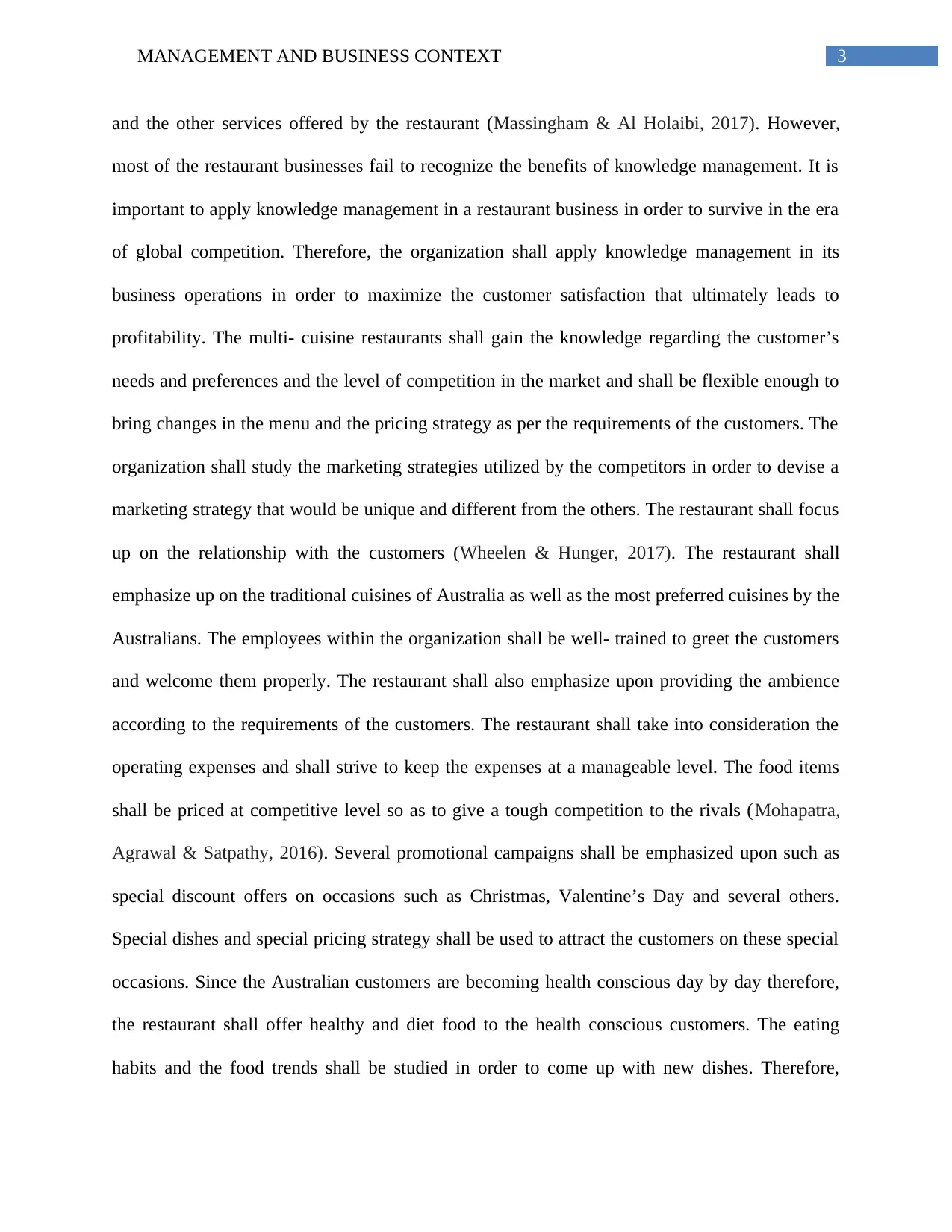
3MANAGEMENT AND BUSINESS CONTEXT
and the other services offered by the restaurant (Massingham & Al Holaibi, 2017). However,
most of the restaurant businesses fail to recognize the benefits of knowledge management. It is
important to apply knowledge management in a restaurant business in order to survive in the era
of global competition. Therefore, the organization shall apply knowledge management in its
business operations in order to maximize the customer satisfaction that ultimately leads to
profitability. The multi- cuisine restaurants shall gain the knowledge regarding the customer’s
needs and preferences and the level of competition in the market and shall be flexible enough to
bring changes in the menu and the pricing strategy as per the requirements of the customers. The
organization shall study the marketing strategies utilized by the competitors in order to devise a
marketing strategy that would be unique and different from the others. The restaurant shall focus
up on the relationship with the customers (Wheelen & Hunger, 2017). The restaurant shall
emphasize up on the traditional cuisines of Australia as well as the most preferred cuisines by the
Australians. The employees within the organization shall be well- trained to greet the customers
and welcome them properly. The restaurant shall also emphasize upon providing the ambience
according to the requirements of the customers. The restaurant shall take into consideration the
operating expenses and shall strive to keep the expenses at a manageable level. The food items
shall be priced at competitive level so as to give a tough competition to the rivals (Mohapatra,
Agrawal & Satpathy, 2016). Several promotional campaigns shall be emphasized upon such as
special discount offers on occasions such as Christmas, Valentine’s Day and several others.
Special dishes and special pricing strategy shall be used to attract the customers on these special
occasions. Since the Australian customers are becoming health conscious day by day therefore,
the restaurant shall offer healthy and diet food to the health conscious customers. The eating
habits and the food trends shall be studied in order to come up with new dishes. Therefore,
and the other services offered by the restaurant (Massingham & Al Holaibi, 2017). However,
most of the restaurant businesses fail to recognize the benefits of knowledge management. It is
important to apply knowledge management in a restaurant business in order to survive in the era
of global competition. Therefore, the organization shall apply knowledge management in its
business operations in order to maximize the customer satisfaction that ultimately leads to
profitability. The multi- cuisine restaurants shall gain the knowledge regarding the customer’s
needs and preferences and the level of competition in the market and shall be flexible enough to
bring changes in the menu and the pricing strategy as per the requirements of the customers. The
organization shall study the marketing strategies utilized by the competitors in order to devise a
marketing strategy that would be unique and different from the others. The restaurant shall focus
up on the relationship with the customers (Wheelen & Hunger, 2017). The restaurant shall
emphasize up on the traditional cuisines of Australia as well as the most preferred cuisines by the
Australians. The employees within the organization shall be well- trained to greet the customers
and welcome them properly. The restaurant shall also emphasize upon providing the ambience
according to the requirements of the customers. The restaurant shall take into consideration the
operating expenses and shall strive to keep the expenses at a manageable level. The food items
shall be priced at competitive level so as to give a tough competition to the rivals (Mohapatra,
Agrawal & Satpathy, 2016). Several promotional campaigns shall be emphasized upon such as
special discount offers on occasions such as Christmas, Valentine’s Day and several others.
Special dishes and special pricing strategy shall be used to attract the customers on these special
occasions. Since the Australian customers are becoming health conscious day by day therefore,
the restaurant shall offer healthy and diet food to the health conscious customers. The eating
habits and the food trends shall be studied in order to come up with new dishes. Therefore,
Paraphrase This Document
Need a fresh take? Get an instant paraphrase of this document with our AI Paraphraser
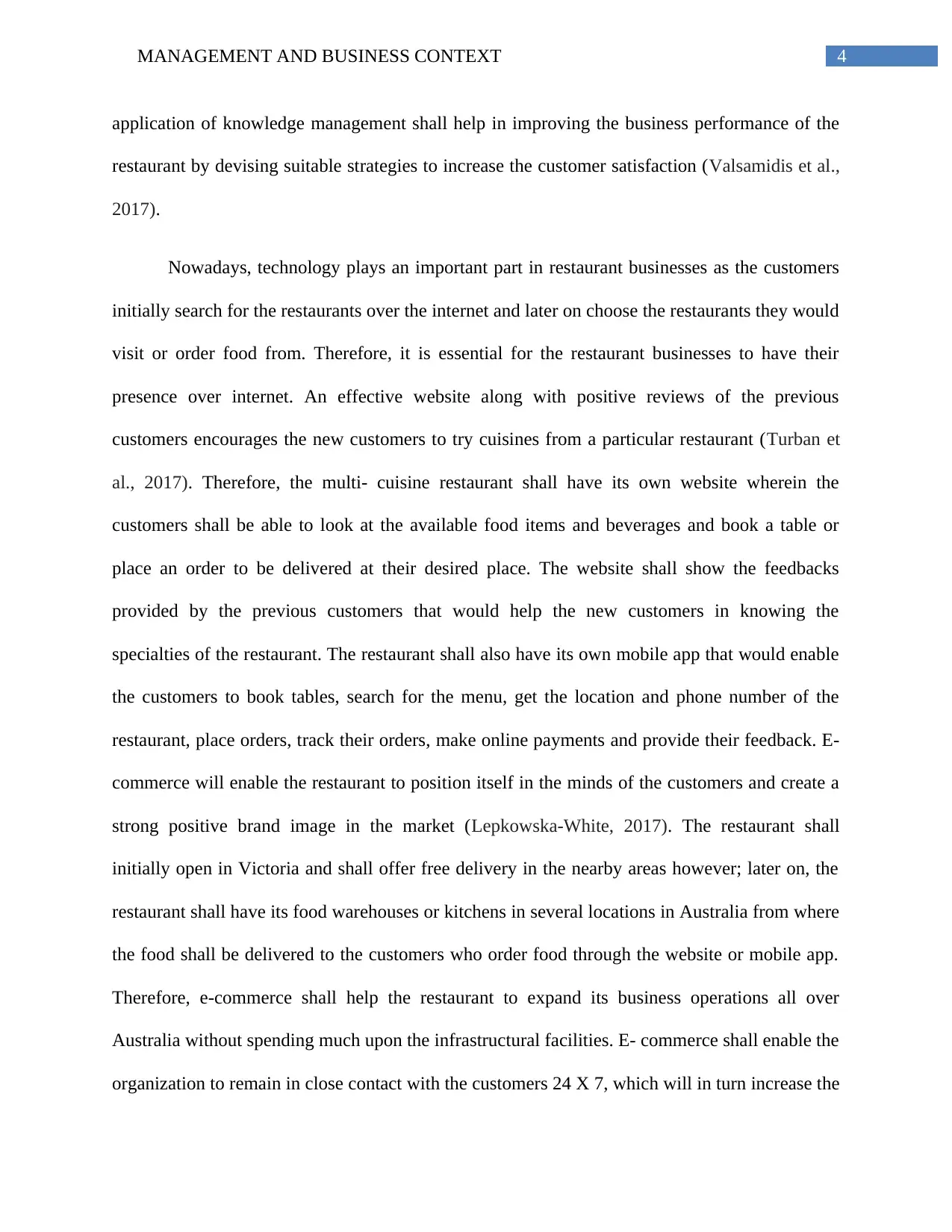
4MANAGEMENT AND BUSINESS CONTEXT
application of knowledge management shall help in improving the business performance of the
restaurant by devising suitable strategies to increase the customer satisfaction (Valsamidis et al.,
2017).
Nowadays, technology plays an important part in restaurant businesses as the customers
initially search for the restaurants over the internet and later on choose the restaurants they would
visit or order food from. Therefore, it is essential for the restaurant businesses to have their
presence over internet. An effective website along with positive reviews of the previous
customers encourages the new customers to try cuisines from a particular restaurant (Turban et
al., 2017). Therefore, the multi- cuisine restaurant shall have its own website wherein the
customers shall be able to look at the available food items and beverages and book a table or
place an order to be delivered at their desired place. The website shall show the feedbacks
provided by the previous customers that would help the new customers in knowing the
specialties of the restaurant. The restaurant shall also have its own mobile app that would enable
the customers to book tables, search for the menu, get the location and phone number of the
restaurant, place orders, track their orders, make online payments and provide their feedback. E-
commerce will enable the restaurant to position itself in the minds of the customers and create a
strong positive brand image in the market (Lepkowska-White, 2017). The restaurant shall
initially open in Victoria and shall offer free delivery in the nearby areas however; later on, the
restaurant shall have its food warehouses or kitchens in several locations in Australia from where
the food shall be delivered to the customers who order food through the website or mobile app.
Therefore, e-commerce shall help the restaurant to expand its business operations all over
Australia without spending much upon the infrastructural facilities. E- commerce shall enable the
organization to remain in close contact with the customers 24 X 7, which will in turn increase the
application of knowledge management shall help in improving the business performance of the
restaurant by devising suitable strategies to increase the customer satisfaction (Valsamidis et al.,
2017).
Nowadays, technology plays an important part in restaurant businesses as the customers
initially search for the restaurants over the internet and later on choose the restaurants they would
visit or order food from. Therefore, it is essential for the restaurant businesses to have their
presence over internet. An effective website along with positive reviews of the previous
customers encourages the new customers to try cuisines from a particular restaurant (Turban et
al., 2017). Therefore, the multi- cuisine restaurant shall have its own website wherein the
customers shall be able to look at the available food items and beverages and book a table or
place an order to be delivered at their desired place. The website shall show the feedbacks
provided by the previous customers that would help the new customers in knowing the
specialties of the restaurant. The restaurant shall also have its own mobile app that would enable
the customers to book tables, search for the menu, get the location and phone number of the
restaurant, place orders, track their orders, make online payments and provide their feedback. E-
commerce will enable the restaurant to position itself in the minds of the customers and create a
strong positive brand image in the market (Lepkowska-White, 2017). The restaurant shall
initially open in Victoria and shall offer free delivery in the nearby areas however; later on, the
restaurant shall have its food warehouses or kitchens in several locations in Australia from where
the food shall be delivered to the customers who order food through the website or mobile app.
Therefore, e-commerce shall help the restaurant to expand its business operations all over
Australia without spending much upon the infrastructural facilities. E- commerce shall enable the
organization to remain in close contact with the customers 24 X 7, which will in turn increase the
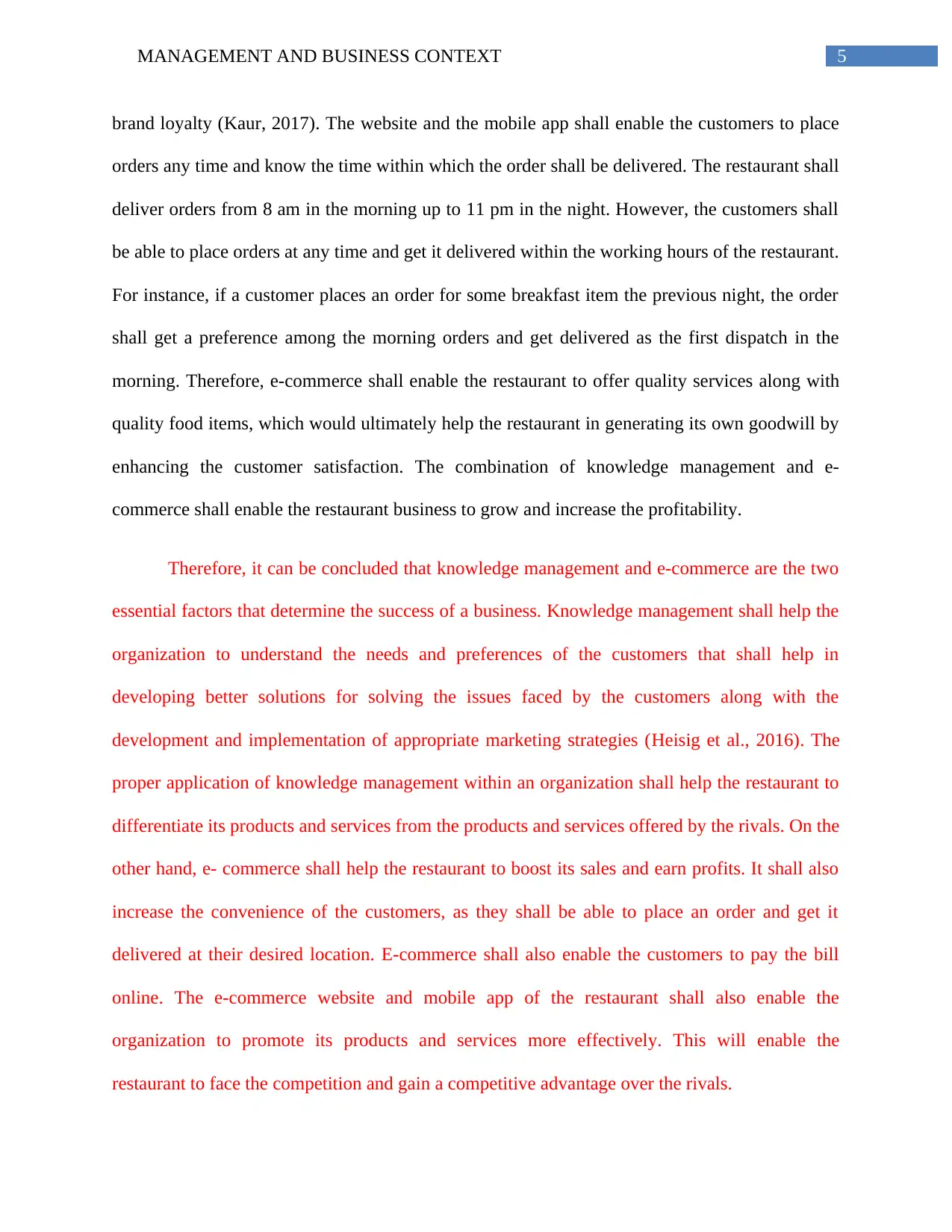
5MANAGEMENT AND BUSINESS CONTEXT
brand loyalty (Kaur, 2017). The website and the mobile app shall enable the customers to place
orders any time and know the time within which the order shall be delivered. The restaurant shall
deliver orders from 8 am in the morning up to 11 pm in the night. However, the customers shall
be able to place orders at any time and get it delivered within the working hours of the restaurant.
For instance, if a customer places an order for some breakfast item the previous night, the order
shall get a preference among the morning orders and get delivered as the first dispatch in the
morning. Therefore, e-commerce shall enable the restaurant to offer quality services along with
quality food items, which would ultimately help the restaurant in generating its own goodwill by
enhancing the customer satisfaction. The combination of knowledge management and e-
commerce shall enable the restaurant business to grow and increase the profitability.
Therefore, it can be concluded that knowledge management and e-commerce are the two
essential factors that determine the success of a business. Knowledge management shall help the
organization to understand the needs and preferences of the customers that shall help in
developing better solutions for solving the issues faced by the customers along with the
development and implementation of appropriate marketing strategies (Heisig et al., 2016). The
proper application of knowledge management within an organization shall help the restaurant to
differentiate its products and services from the products and services offered by the rivals. On the
other hand, e- commerce shall help the restaurant to boost its sales and earn profits. It shall also
increase the convenience of the customers, as they shall be able to place an order and get it
delivered at their desired location. E-commerce shall also enable the customers to pay the bill
online. The e-commerce website and mobile app of the restaurant shall also enable the
organization to promote its products and services more effectively. This will enable the
restaurant to face the competition and gain a competitive advantage over the rivals.
brand loyalty (Kaur, 2017). The website and the mobile app shall enable the customers to place
orders any time and know the time within which the order shall be delivered. The restaurant shall
deliver orders from 8 am in the morning up to 11 pm in the night. However, the customers shall
be able to place orders at any time and get it delivered within the working hours of the restaurant.
For instance, if a customer places an order for some breakfast item the previous night, the order
shall get a preference among the morning orders and get delivered as the first dispatch in the
morning. Therefore, e-commerce shall enable the restaurant to offer quality services along with
quality food items, which would ultimately help the restaurant in generating its own goodwill by
enhancing the customer satisfaction. The combination of knowledge management and e-
commerce shall enable the restaurant business to grow and increase the profitability.
Therefore, it can be concluded that knowledge management and e-commerce are the two
essential factors that determine the success of a business. Knowledge management shall help the
organization to understand the needs and preferences of the customers that shall help in
developing better solutions for solving the issues faced by the customers along with the
development and implementation of appropriate marketing strategies (Heisig et al., 2016). The
proper application of knowledge management within an organization shall help the restaurant to
differentiate its products and services from the products and services offered by the rivals. On the
other hand, e- commerce shall help the restaurant to boost its sales and earn profits. It shall also
increase the convenience of the customers, as they shall be able to place an order and get it
delivered at their desired location. E-commerce shall also enable the customers to pay the bill
online. The e-commerce website and mobile app of the restaurant shall also enable the
organization to promote its products and services more effectively. This will enable the
restaurant to face the competition and gain a competitive advantage over the rivals.
⊘ This is a preview!⊘
Do you want full access?
Subscribe today to unlock all pages.

Trusted by 1+ million students worldwide
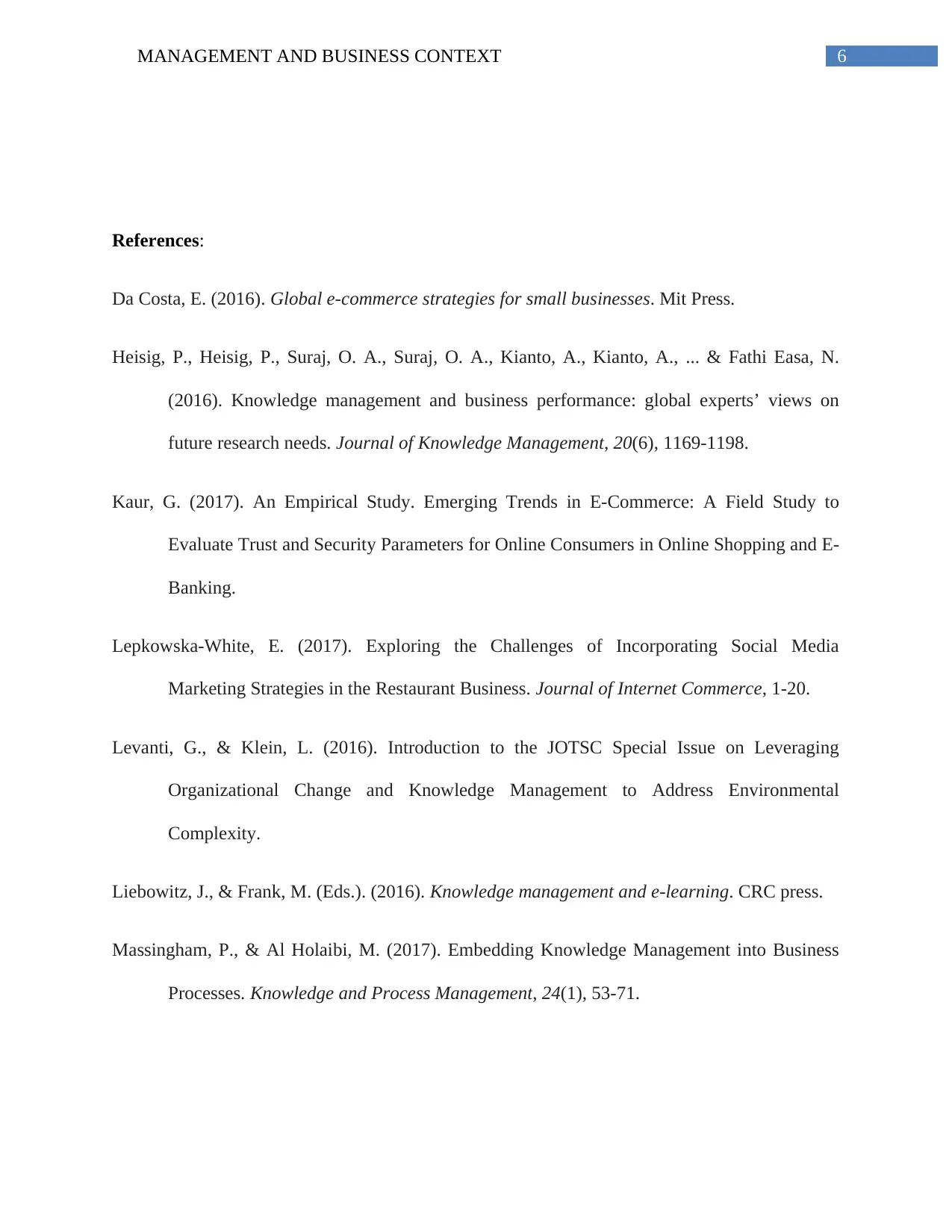
6MANAGEMENT AND BUSINESS CONTEXT
References:
Da Costa, E. (2016). Global e-commerce strategies for small businesses. Mit Press.
Heisig, P., Heisig, P., Suraj, O. A., Suraj, O. A., Kianto, A., Kianto, A., ... & Fathi Easa, N.
(2016). Knowledge management and business performance: global experts’ views on
future research needs. Journal of Knowledge Management, 20(6), 1169-1198.
Kaur, G. (2017). An Empirical Study. Emerging Trends in E-Commerce: A Field Study to
Evaluate Trust and Security Parameters for Online Consumers in Online Shopping and E-
Banking.
Lepkowska-White, E. (2017). Exploring the Challenges of Incorporating Social Media
Marketing Strategies in the Restaurant Business. Journal of Internet Commerce, 1-20.
Levanti, G., & Klein, L. (2016). Introduction to the JOTSC Special Issue on Leveraging
Organizational Change and Knowledge Management to Address Environmental
Complexity.
Liebowitz, J., & Frank, M. (Eds.). (2016). Knowledge management and e-learning. CRC press.
Massingham, P., & Al Holaibi, M. (2017). Embedding Knowledge Management into Business
Processes. Knowledge and Process Management, 24(1), 53-71.
References:
Da Costa, E. (2016). Global e-commerce strategies for small businesses. Mit Press.
Heisig, P., Heisig, P., Suraj, O. A., Suraj, O. A., Kianto, A., Kianto, A., ... & Fathi Easa, N.
(2016). Knowledge management and business performance: global experts’ views on
future research needs. Journal of Knowledge Management, 20(6), 1169-1198.
Kaur, G. (2017). An Empirical Study. Emerging Trends in E-Commerce: A Field Study to
Evaluate Trust and Security Parameters for Online Consumers in Online Shopping and E-
Banking.
Lepkowska-White, E. (2017). Exploring the Challenges of Incorporating Social Media
Marketing Strategies in the Restaurant Business. Journal of Internet Commerce, 1-20.
Levanti, G., & Klein, L. (2016). Introduction to the JOTSC Special Issue on Leveraging
Organizational Change and Knowledge Management to Address Environmental
Complexity.
Liebowitz, J., & Frank, M. (Eds.). (2016). Knowledge management and e-learning. CRC press.
Massingham, P., & Al Holaibi, M. (2017). Embedding Knowledge Management into Business
Processes. Knowledge and Process Management, 24(1), 53-71.
Paraphrase This Document
Need a fresh take? Get an instant paraphrase of this document with our AI Paraphraser
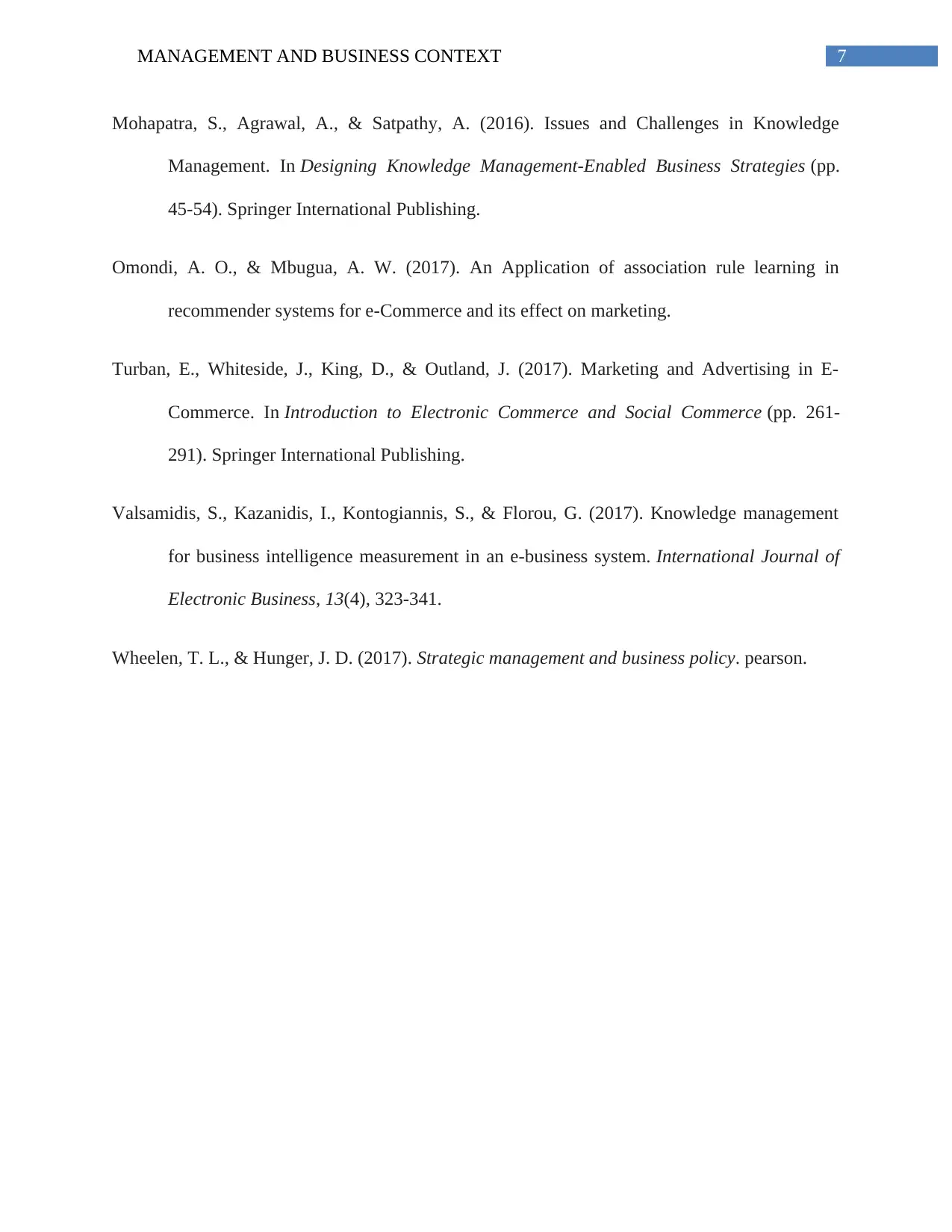
7MANAGEMENT AND BUSINESS CONTEXT
Mohapatra, S., Agrawal, A., & Satpathy, A. (2016). Issues and Challenges in Knowledge
Management. In Designing Knowledge Management-Enabled Business Strategies (pp.
45-54). Springer International Publishing.
Omondi, A. O., & Mbugua, A. W. (2017). An Application of association rule learning in
recommender systems for e-Commerce and its effect on marketing.
Turban, E., Whiteside, J., King, D., & Outland, J. (2017). Marketing and Advertising in E-
Commerce. In Introduction to Electronic Commerce and Social Commerce (pp. 261-
291). Springer International Publishing.
Valsamidis, S., Kazanidis, I., Kontogiannis, S., & Florou, G. (2017). Knowledge management
for business intelligence measurement in an e-business system. International Journal of
Electronic Business, 13(4), 323-341.
Wheelen, T. L., & Hunger, J. D. (2017). Strategic management and business policy. pearson.
Mohapatra, S., Agrawal, A., & Satpathy, A. (2016). Issues and Challenges in Knowledge
Management. In Designing Knowledge Management-Enabled Business Strategies (pp.
45-54). Springer International Publishing.
Omondi, A. O., & Mbugua, A. W. (2017). An Application of association rule learning in
recommender systems for e-Commerce and its effect on marketing.
Turban, E., Whiteside, J., King, D., & Outland, J. (2017). Marketing and Advertising in E-
Commerce. In Introduction to Electronic Commerce and Social Commerce (pp. 261-
291). Springer International Publishing.
Valsamidis, S., Kazanidis, I., Kontogiannis, S., & Florou, G. (2017). Knowledge management
for business intelligence measurement in an e-business system. International Journal of
Electronic Business, 13(4), 323-341.
Wheelen, T. L., & Hunger, J. D. (2017). Strategic management and business policy. pearson.
1 out of 8
Related Documents
Your All-in-One AI-Powered Toolkit for Academic Success.
+13062052269
info@desklib.com
Available 24*7 on WhatsApp / Email
![[object Object]](/_next/static/media/star-bottom.7253800d.svg)
Unlock your academic potential
Copyright © 2020–2026 A2Z Services. All Rights Reserved. Developed and managed by ZUCOL.





